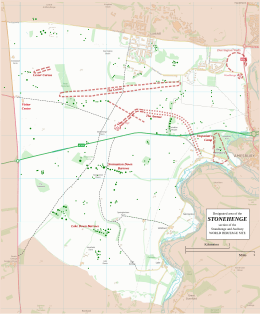Blick Mead facts for kids
|
Map showing Blick Mead within the Stonehenge section of the Stonehenge and Avebury World Heritage Site
|
|
| Location | OS SU14934204 |
|---|---|
| Region | Wiltshire |
| Coordinates | 51°10′37″N 1°47′17″W / 51.177001°N 1.788161°W |
| Type | Mesolithic site |
| History | |
| Periods | Mesolithic |
| Site notes | |
| Excavation dates | 2005 onwards |
| Designated | 1986 |
| Reference no. | 373 |
Blick Mead is a special place in Wiltshire, England. It is a natural spring that comes from chalky ground. What makes it unique is that its water stays at a constant temperature of about 11°C (52°F). This means it never freezes, even in winter!
Blick Mead is very close to an old Iron Age fort called Vespasian's Camp. It is also only about a mile away from the famous Stonehenge monument. Since 2005, archaeologists have been digging here. They have found proof that people lived at Blick Mead for a very long time. Humans were present from around 10,000 years ago (8,000 BCE) until about 6,000 years ago (4,000 BCE).
Contents
Discovering Ancient Life at Blick Mead
Archaeologists have found many interesting things at Blick Mead. They discovered over 35,000 worked flints. These are pieces of stone shaped by humans, likely for tools or weapons. They also found 2,400 animal bones. Many of these bones came from Aurochs, which were huge wild cattle. Some of the bones even showed signs of being cooked.
What the Finds Tell Us
The discoveries at Blick Mead include the remains of a pit dwelling. This was a simple shelter dug into the ground. Scientists used the bones and other materials to figure out when people lived here. They used a method called radiocarbon dating. This helps them learn the age of ancient objects.
It is believed that Blick Mead was a great place for ancient people to live or camp. The spring that never froze would have provided fresh water all year round. This was very important for survival in prehistoric times.
The Mysterious Red Stones
A very rare type of algae lives in the Blick Mead spring. It is called Hildenbrandia. This algae has a strange effect on stones taken from the spring. When these stones are exposed to the air, they turn bright red in just a few hours!
In Mesolithic times, when people were hunter-gatherers, this color-changing effect might have seemed magical. It could have given the place a special meaning.
Blick Mead and Stonehenge
Blick Mead's closeness to Stonehenge has led to exciting ideas. Some experts think that Blick Mead was the original reason people came to this area. They believe the constant spring and the stones that turned red made the spot very important. It might have had a spiritual meaning for the ancient people who lived there. This could explain why they later built the huge Stonehenge monument nearby.
 | Selma Burke |
 | Pauline Powell Burns |
 | Frederick J. Brown |
 | Robert Blackburn |


